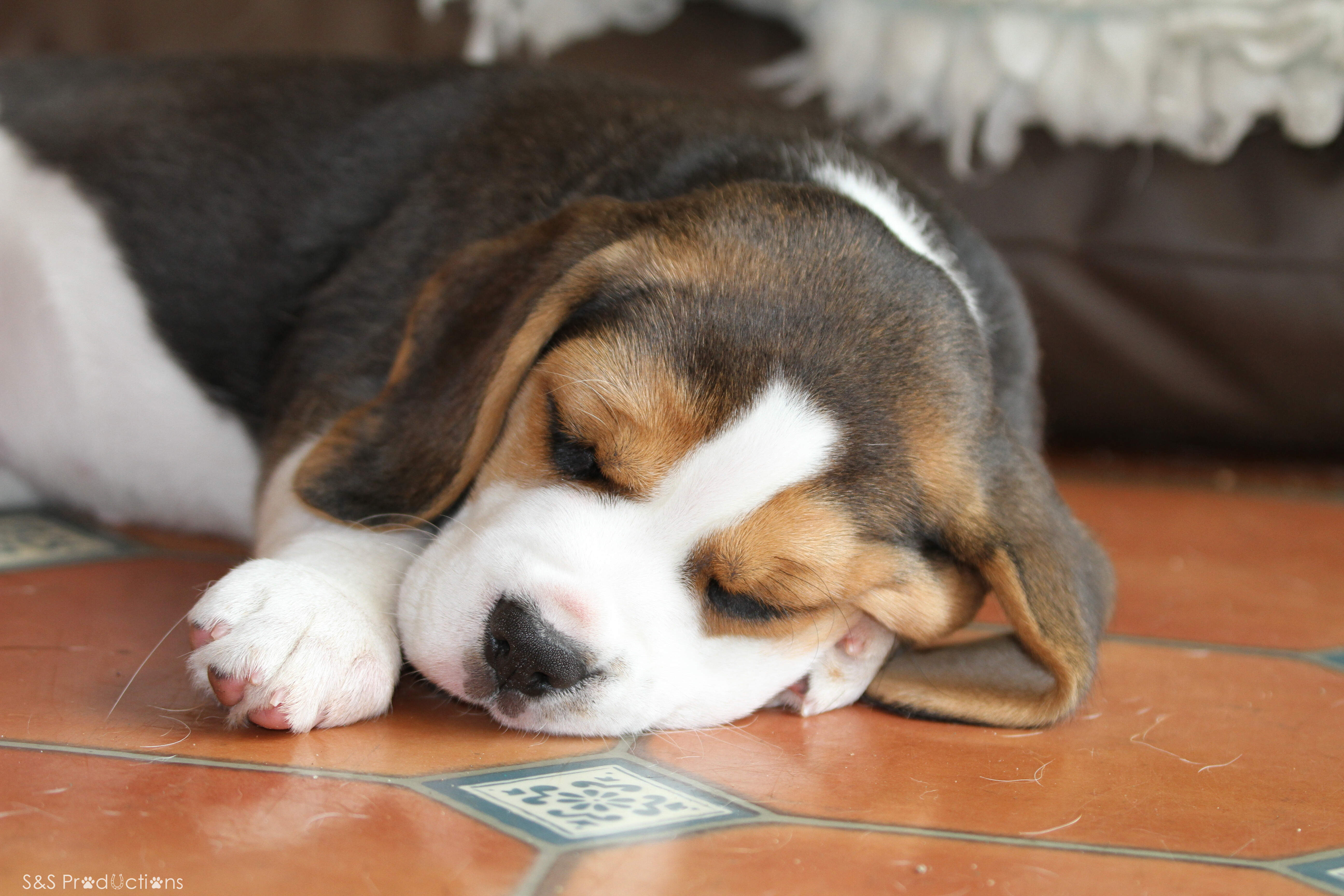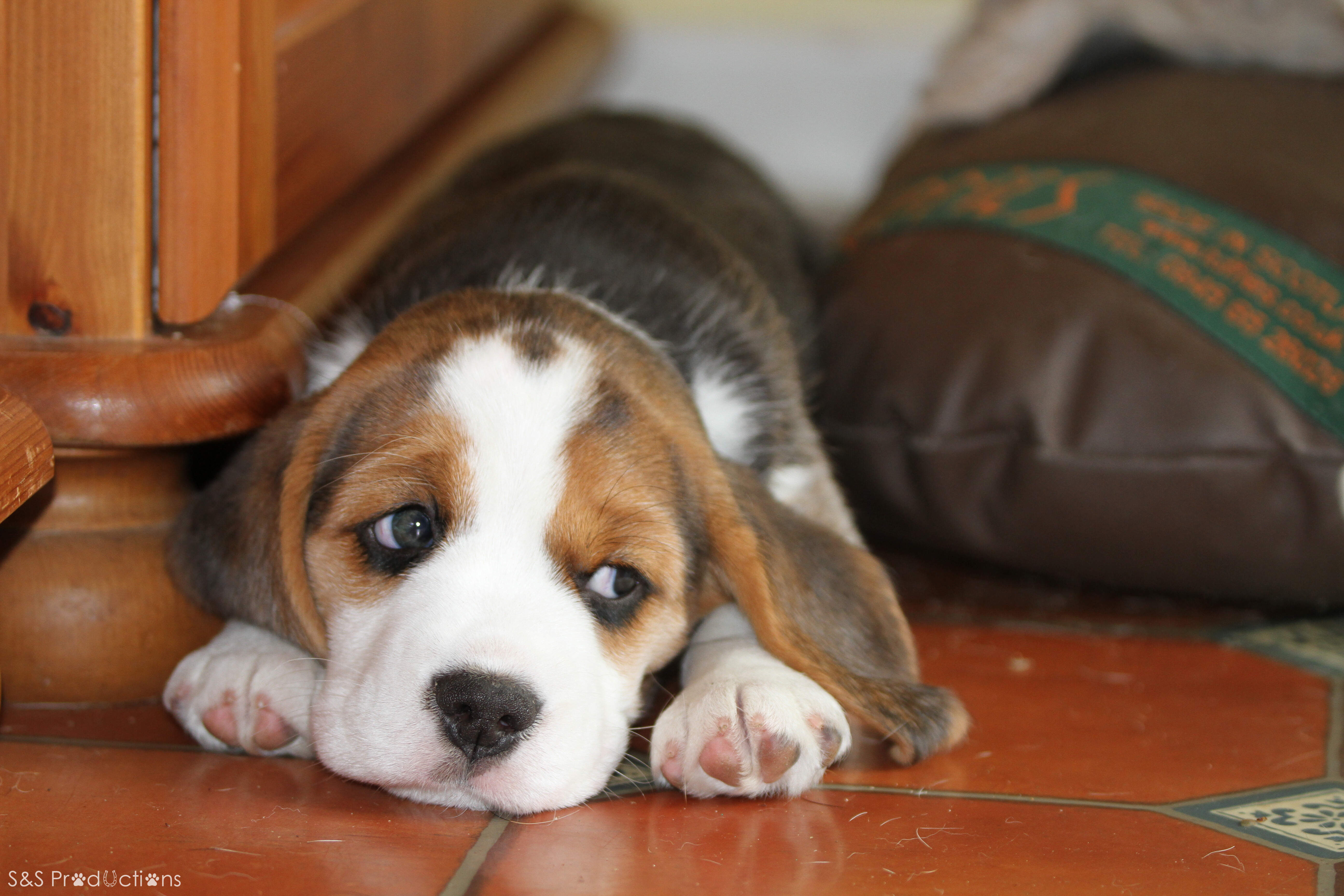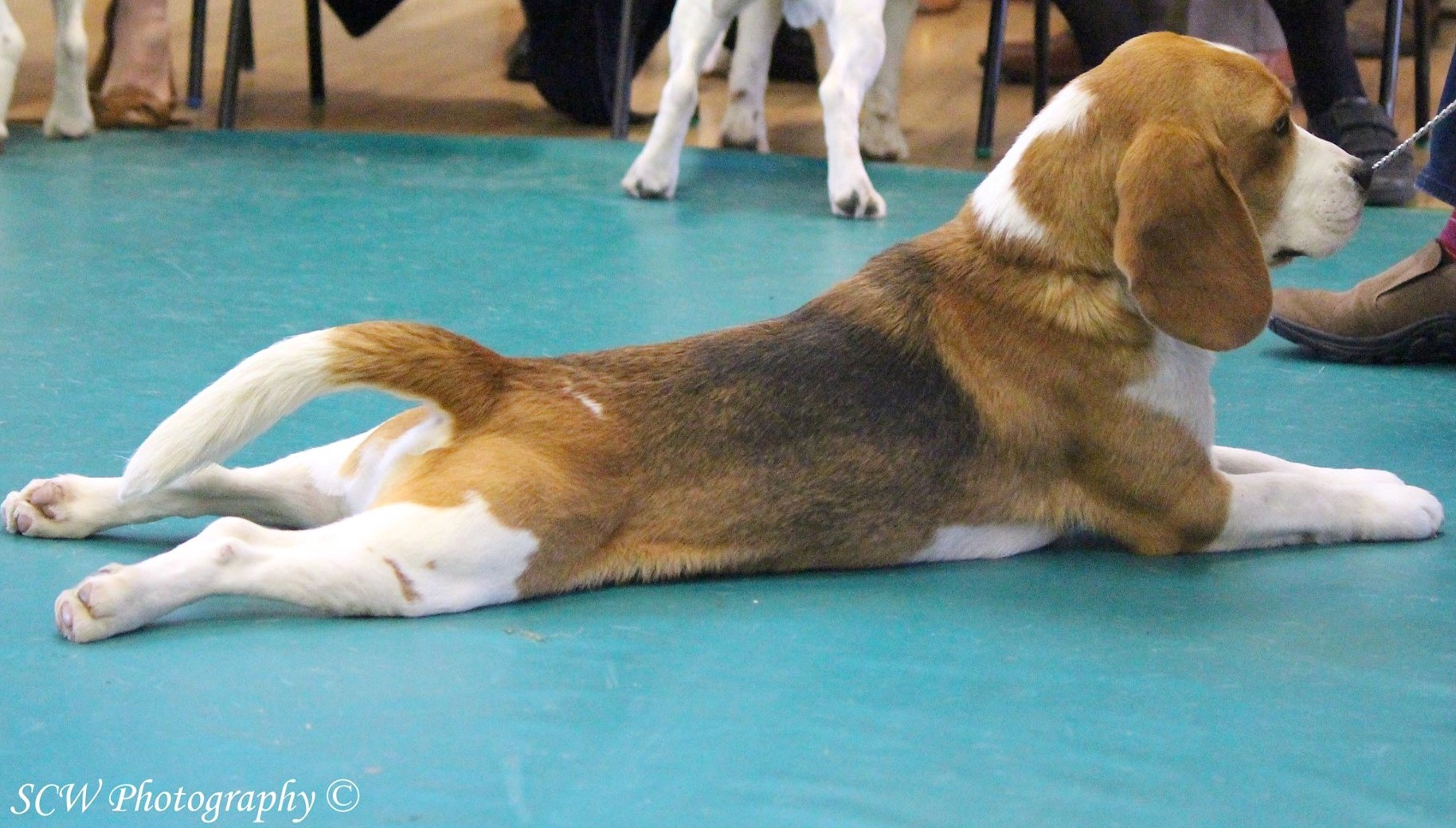Beagles as Pets
A Guide for Prospective Beagle Owners
THE BEAGLE is a medium sized hound which stands between 13 and 16 inches high at the shoulder and weighs no more than 15 kilos. The majority are tricolour (black, brown & white), some are tan or lemon and white and various colours of mottle. It was originally bred for hunting hares in packs, and today Beagles are normally sociable, mischievous, healthy and delightful members of an active household.
Beagles enjoy company, whether it is human, canine or feline, and dislike being left on their own. A household where the whole family is out from morning to evening is quite unsuitable for a Beagle. So too is a home without a garden, which needs to be fenced with 'Colditz' in mind! Beagles can dig as well as jump, so 5 to 6 foot fencing is recommended.
Beagles are tough, and love being with a family, but children must be taught to respect all dogs and not treat them like toys. Your hound should be provided with a special place of its own (like the folding metal crates described later in this leaflet) where children are not allowed to go or disturb the dog. Bringing a Beagle into your home is a great commitment in time and patience and some people have found that they are unable to cope with a very young family at the same time.
Exercise - Remember that your adult hound will need to be exercised for at least an hour each day, and part of that time should, if possible, be free running in a safe area away from traffic or livestock.
If you are sure that a Beagle will suit your lifestyle and you have the right environment to ensure a happy and contented life for a hound, then you have a choice of:-
A) buying a puppy from a reputable breeder i.e. a member of a Beagle breed club/the KC Assured Breeders Scheme or
B) giving a home to an older hound through
Beagle Welfare Registered Charity No. 328633.
www.beagleadvice.org.uk
Advice on Buying a Beagle Puppy
ALWAYS buy a puppy from a specialist Beagle breeder who is a member of a Beagle Breed Club and the Kennel Club Assured Breeders Scheme where you will see the puppies with their mother, and sometimes even the father. NEVER obtain a puppy from a Pet Shop, Puppy Dealer, ebay or Market etc. The Secretaries of Beagle Breed Clubs and also the Kennel Club website will be able to give you the details of reputable breeders in your area. You may be able to see a litter of puppies by appointment; but please don't turn up with the whole family on the first visit. Talking to a breeder and with other owners will give you additional information about the needs of a Beagle. Please do not commit yourself to buying a puppy unseen via the Internet where the puppy will be delivered after payment Visiting Discover Dogs at ExCel, London in October or Crufts at NEC Birmingham in March is also a very good idea. Breed clubs also hold shows and events that you would be welcomed to attend.
A Beagle puppy is ready to go to its new home once it is 8 weeks old, and a responsible breeder will have begun the process of socialising the puppy with a variety of people and noises before it goes to its new home. The progeny of a bitch who is 8 years or older or who has already reared six litters of puppies cannot be registered at the Kennel Club. Many breeders insure their puppies for veterinary costs, loss, etc., for the first few weeks with their new owners, and you are advised to consider extending the cover with a special policy. The breeder will hand over the KC Registration Certificate and a Diet Sheet as well as a Contract of Sale and details of worming and any vaccinations. Puppies, by law, have to be microchipped by the breeder by 8 weeks so please remember to transfer the puppy to your ownership both at the Kennel Club and the Micro-chip company.
The early weeks of a puppy's life are vital in its development, both physical and emotional. It is a good idea to read up about a dog's development before you take your puppy home so that the whole family can be consistent in its approach to training. In most areas there are classes for puppies from approx. 12 weeks of age (or when they are fully inoculated), known as 'Puppy Socialisation classes' or 'Puppy Parties' where you can begin the training of your puppy when it is most receptive, and where 'training' is great fun. Your local Vet may be able to put you in touch with your nearest class or search www.thekennelclub.org.uk/findadogclub. Look for classes that aim for the KC Good Citizens Award Scheme.
Time spent with your puppy during these first weeks will pay off handsomely as your hound grows into a well-balanced and well-behaved companion.
Preparing To Take Your New Beagle Home
- Ensure that your GARDEN is completely escape proof and be aware that a Beagle can get caught in wrought iron gates and some types of paling fence. Some common garden plants and chemicals are poisonous to dogs and Cocoa Mulch and anti-freeze are also lethal if eaten. Avoid slugs and snails and take great care if you have a puppy and a garden pond.
- Make sure that there are no electric cables or trailing leads in the area in which your Beagle will sometimes be left unattended, because they may be chewed - with fatal results. Plastic is also highly palatable to Beagles.
- Your Beagle will also need its own water and feeding bowls - metal ones are safest for a puppy as they enjoy chewing the plastic variety! A small soft collar and a lightweight nylon lead are suitable for a puppy and some indestructible toys.
Allocate an area and a bed that are the Beagle's OWN. Most owners find a warm area in the kitchen or utility room which can be adapted, and with a puppy, making a 'pen' using mesh panels (available at Argos and on-line) or a baby's play pen, is ideal. As far as the bed itself is concerned, the hard-moulded plastic variety is easy to keep clean and more resistant to chewing than the wicker type. If you are having a puppy it is best to start off with a cardboard box with one side cut down as an entrance - this can be replaced as the puppy grows and chews, but avoid boxes with metal staples which can be dangerous.
You might consider buying a collapsible metal crate as the Beagle's own 'house'. Beagles love these and they have a wide variety of uses. They make ideal dog beds at home and on holiday, a place to go away from visitors and their children (especially if they dislike dogs), a safe place if doors are left open, and a safe haven when potentially dangerous activities are going on in the home. They can also be an aid to house training, but a young puppy should never be left in one for too long (2 to 3 hours max during the daytime) without an opportunity to relieve itself.
Because these crates are collapsible and fold flat in seconds, they are also ideal for using in the car, with no fear of your Beagle ever jumping out as soon as the car door is opened, and they can also protect the interior from costly damage. As with a child, never travel with a dog on your lap or unsecured on the rear seat or in the rear luggage area of an estate type vehicle. Never leave your Beagle in a vehicle on a warm or sunny day even with windows/roof open.
A Beagle will need a crate at least 24" x 18" x 21" so that it can sit; stand and stretch in comfort. They are available from Argos etc. and can also be sourced on the Internet and pet supermarkets. Shaped styles of these are available to fit specific cars or can be purchased “made-to-measure”.
Whichever type of bed you decide to use, your Beagle will need clean bedding at least once a week. Something old and warm can be used for a puppy to snuggle up in, but do check that there are no buttons or fasteners left on that can be chewed and swallowed. Avoid foam, which Beagles love to tear. You can also buy a special type of warm, non-allergenic bedding called 'Vet-Bed' from good pet stores or on-line, which many breeders use for rearing puppies. It is tough and hard-wearing and can be put in the washing machine but can be too hot in the summer months for some Beagles.
One other piece of equipment Beagle owners find useful is a 'Baby Gate', as this can be used to bar your hound from a specific room, or from going upstairs, but your hound will still be able to see you and not feel left out of the family's activities. Take care small puppies cannot put their head through bars.
A Healthy and Happy Beagle
As soon as you obtain your Beagle puppy contact your local Veterinary Surgeon to find out their programme of vaccinations. This does vary with the type of vaccines used, but until your puppy has received its first full course it must not be taken out where other dogs may have been or mix with unvaccinated dogs. You can still take your puppy out to get used to new noises and sights by wrapping it in a blanket or towel (in case of leaks!) and carrying it safely in your arms, or taking it for short journeys in the car. Many vaccines need a yearly booster, and licensed boarding kennels will need proof that this has been kept up to date. If you obtain a 'rescued' Beagle vaccination details will be passed to you where available, but if there is any doubt as to whether the vaccinations are up to date, then you should seek veterinary advice. Remember also that puppies and adult hounds must be regularly wormed. Your puppy will have its worming procedure up to date when it leaves a reputable the breeder. If you want to take your puppy overseas and return to the UK you will need to apply for the Pet Passport Scheme which at present entails a Rabies inoculation at least 21days before travel. For the very latest information go to http://www.defra.gov.uk/brexit-pet-travel
Beagle coats are easily kept clean with a quick brush through every day, and when they moult a fine comb will help to get rid of unwanted hair quickly. Start this routine with a light brush from puppy hood. Feel free to bath your Beagle whenever needed, but don't let your hound get cold when drying, and remember that clean bedding helps to keep your hound healthy. Watch out for fleas & mites, especially in hot weather or if there are cats and hedgehogs around, and, if necessary, treat adult hounds with a spray or shampoo. Never treat a young puppy for fleas without first obtaining veterinary advice.
Check weekly that your Beagle's ears are clean and get your hound used to having it's teeth inspected and cleaned weekly. Some hounds, especially those who do not get much exercise on hard surfaces, grow rather long toenails, so pay attention to them by clipping the tip off or by filing, otherwise you will need to get your Vet's help.
Beagles are not normally difficult dogs to feed, but do keep to the breeder's recommended diet, because any sudden changes may well upset the puppy's digestive system. Never feed titbits or scraps from the table as Beagles very soon become over-weight. There are many good quality complete diets that come in pellet form; these are economical and convenient to use. As your hound gets older and less active you may need to adjust the diet and feed less protein. Remember that clean water must always be available even for a puppy. Normal weight for an adult Beagle is in the range 13 to 15 kilos.
Training
Once your Beagle has settled in and is full inoculated, do attend a training class. Veterinary Surgeries normally know of local classes or you may have a neighbour or friend who can recommend a club in your area, see also - www.thekennelclub.org.uk/findadogclub. As soon as you transfer your puppy (this can be done on-line) the Kennel Club will send you an extremely useful book on Puppy Training.
Your Responsibilities
By law your Beagle must now be microchipped by 8 weeks, which is a great help in proving ownership, and returning found dogs to their legal owners. They must wear a collar when in a public place, bearing your name, address & tel/mobile number. Remember to check regularly that the tag is still in place and clearly readable and change the address etc. if you are away on holiday.
The Animals/Dangerous Dog Acts place responsibility for any accident or damage caused by your dog firmly on YOU. Check your household insurance policy or think about taking out a special dog insurance with one of the specialised companies. Shop around as the policies do vary in cover and price.
Don't play into the hands of the anti-dog lobby, so train your Beagle not to foul in public places and always carry a plastic bag or 'poop-scoop' to clean up any mistakes. Please be a responsible Beagle owner and never allow your hound to be noisy or annoy others.
Please think very carefully before you invite a Beagle to join your household, but remember that in return for your time and care, a Beagle will reward you with love and friendship for an average of 12 to 14 years.
UPDATED HEALTH INFORMATION – 2020
The main conditions that have been reported to the Beagle Health Co-ordinator in recent years are as follows: Steroid Responsive Meningitis (SRM) colloquially known as Beagle Pain Syndrome or Stiff Beagle Disease; Canine Epilepsy; Musladin-Leuke Syndrome (MLS), [Chinese Beagle Syndrome]; NCCD and Factor VII & IGS. In 2017 a DNA test became available for Lafora, a type of epilepsy. These are not all unique to Beagles. You may find mention of other conditions in the breed, but these are very much less common in the UK or have been reported in Beagles bred especially for Laboratory Experiments. Look for the latest information on www.beaglehealth.info.
USEFUL SOURCES OF INFORMATION
Southern Counties Beagle Club Secretary, Sally Kimber, Email: scbc.sec@btinternet.com .
Beagle Health Co-ordinator Samantha Goldberg BVSc MRCVS: Email samgoldberg@btinternet.com
www.beaglewelfare.org.uk (Registered Charity 328633)
The Kennel Club
Clarges Street
Piccadilly
LONDON W1E 8BT
Most breed clubs also have FB pages
“Beagles As Pets” was originally compiled in 1991 by S Kimber, with contributions from P. Carmichael, A D’Arcy and many others, for BEAGLE WELFARE and the BEAGLE ASSOCIATION It is for the use of all Breed Clubs – for the benefit and education of all existing and future Beagle owners. No part of this publication may be reproduced, in any form or by any means, without the prior written permission of The Beagle Association or Beagle Welfare. Revised 2020



